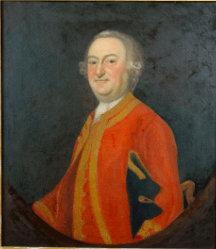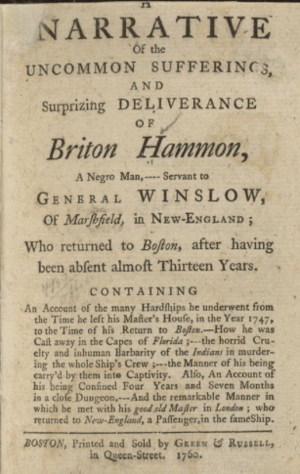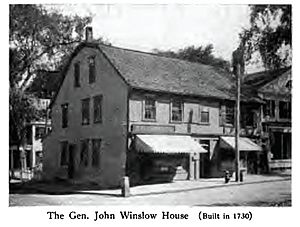John Winslow (British Army officer) facts for kids

John Winslow (born May 10, 1703 – died April 17, 1774) was an important military officer. He served during the French and Indian War. John Winslow came from a very well-known family in New England. His great-grandfather, Edward Winslow, and his grandfather, Josiah Winslow, were both governors of the Plymouth Colony.
John Winslow was born in Marshfield, Massachusetts, in 1703. His parents were Sarah and Isaac Winslow. During a conflict called Father Rale's War, John's older brother, Josiah, was killed by Native Americans. This happened during the Northeast Coast Campaign of 1724. The next year, John named his first son Josiah, after his lost brother.
In 1725, John Winslow married Mary Little. She was a descendant of Richard Warren, an early settler. They had three children: Josiah, Pelham, and Isaac Winslow. One of the people enslaved by John Winslow was Briton Hammon. Briton Hammon later wrote a book about his experiences in 1760.
After holding some smaller jobs in Plymouth, John Winslow became a captain. He joined a British military mission to Cuba in 1740, but this mission was not successful. After that, he joined the British Army. He served as a captain in the 40th Foot regiment. He was stationed in places like Annapolis Royal in Nova Scotia and St. John's in Newfoundland.
Contents
Serving in the Seven Years' War

In 1754, John Winslow was promoted to major-general of the militia. This promotion came from Governor William Shirley of Massachusetts. Winslow was put in charge of 800 soldiers. They were sent to the Kennebec River in Maine. Their job was to strengthen British control and stop French expansion. While there, he oversaw the building of two forts: Fort Halifax (Maine) and Fort Western.
In 1755, Winslow became a lieutenant-colonel. He led a provincial regiment (local soldiers). This regiment was formed by Governor Shirley. Its goal was to help Lieutenant Governor Charles Lawrence of Nova Scotia. They aimed to reduce French Acadian influence in the area. Winslow played an important role in capturing Fort Beauséjour in June 1755.
The Acadian Deportation
During the Bay of Fundy Campaign in 1755, Winslow received a difficult order. He was told to go to Grand-Pré, Nova Scotia. His task was to remove the Acadian people from the area. This event is known as the Great Upheaval. While Winslow was in charge of one part of this operation, it was a much larger effort.
On September 5, 1755, he gathered the Acadian men. He informed them that they and their families would be moved from the province. Winslow wrote in his journal that this task was "Very Disagreable to my natural make & Temper." There were many delays in getting ships ready. This made the deportation take much longer than planned. By November, he had sent 1,510 Acadians to other British colonies. These included Pennsylvania and Maryland.
Winslow returned to Massachusetts in November 1755. However, just a few months later, he was given another command. Governor Shirley appointed him to lead provincial troops. This expedition was against Fort St. Frédéric in New York.
Conflict with Lord Loudoun
In March 1756, a new commander, Lord Loudoun, arrived from Britain. Winslow had strong disagreements with him. Lord Loudoun wanted to combine the provincial troops with the regular British army. The provincial soldiers had joined up to serve only under their own officers. They were worried about the strict discipline of the regular army. Their officers also feared losing their rank. This was because their ranks came from colonial appointments.
This disagreement almost led to a rebellion among the provincial troops and their officers. However, Winslow eventually agreed to the integration. He did so after threats from Lord Loudoun.
Later Life and Legacy
In 1757, Winslow returned to Massachusetts and civilian life. He represented Marshfield in the General Court (a type of legislature). He served from 1757 to 1758 and again from 1761 to 1765. In 1762, he was part of a group that decided the border of the St. Croix River. Around 1766, he moved to Hingham, Massachusetts. He passed away there in 1774.
The town of Winslow, Maine is named in honor of General John Winslow.
 | Aurelia Browder |
 | Nannie Helen Burroughs |
 | Michelle Alexander |


